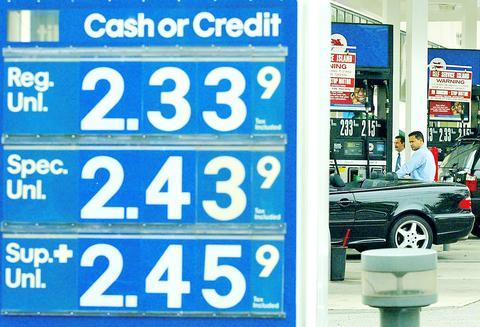As US petrol prices soar to record levels, motorists are fuelling environmentalists' dreams by scrambling to trade in their gas-guzzling four-wheel drives for hybrid or hydrogen-powered vehicles.
The growing drain on American pockets is not only showing signs of ending the craze for sports utility vehicles (SUVs), it may also spark long-delayed investment in cars that use alternative fuel.
"With gasoline prices reaching beyond US$2 per gallon [3.78 liters] and the general concern over the US dependence on foreign oil, hybrid vehicles are catching more consumers' attention and, consequently, investor interest," said Michael Bruynesteyn of Prudential Equity Group.

PHOTO: REUTERS
He said that while environmentally friendly hybrid vehicles -- which combine electric power and combustion engines -- were first introduced to US drivers by Honda in 1999, they have been confined to a tiny niche market.
But the gas-price increase in a country long used to low fuel costs could well see that market explode this year far beyond its faithful clutch of Hollywood stars like Harrison Ford.
"People are buying hybrids because of mileage benefits and environmental concerns," agreed Lonnie Miller of Polk's Analytical Solutions. "With the rising cost of gas in the US, hybrid registrations will likely increase in 2004."
And the rush for the relatively expensive vehicles has already begun.
Just 43,435 hybrid vehicles were sold in the US last year, with Honda's Civic accounting for half. But the hybrid Civic sold almost 3,000 cars last month alone, suggesting a huge jump in overall hybrid sales.
Hybrids, whose fuel engines kick in only when the electric battery runs out, are "showing early signs of moving into the mainstream," according to Bruynesteyn.
Also in vogue are hydrogen-powered cars, which are very environmentally friendly, emitting only water vapor instead of carbon monoxide like petrol-powered cars. They are also quiet, decrease greenhouse gas emissions and boast boosted energy efficiency.
Hydrogen vehicles have found an unusual ally in US President George W. Bush, criticized by his foes for his environmental record, who last year announced a US$1.2 billion plan to develop hydrogen-powered cars in a bid to decrease US dependency on foreign oil.
In April, several private firms received a share of US$350 million supplied by the US government to further research the development of hydrogen cars.
But hydrogen cars also have some detractors, who say the system is expensive, difficult and potentially dangerous to store, as it takes up a lot of space -- requiring much bigger fuel tanks -- and is highly flammable.
Meanwhile, the once-booming sales of SUVs are falling across the US as petrol prices rise.
A study by Autodata showed that sales of three of the most popular US-made SUVs fell by 21 percent, 25 percent and 34 percent in April compared with the same period last year.
"Over the last few months, we have seen a decrease of SUV sales," said Mark McCready, director of Carsdirect.com, a Los Angeles-based firm which specializes in online car sales.
"Usually at this time of the year, we see a huge number of people who want to buy SUVs. This has not been the case this year. In the past months, we have seen a decline of consumers interested in buying SUVs," he said.

The CIA has a message for Chinese government officials worried about their place in Chinese President Xi Jinping’s (習近平) government: Come work with us. The agency released two Mandarin-language videos on social media on Thursday inviting disgruntled officials to contact the CIA. The recruitment videos posted on YouTube and X racked up more than 5 million views combined in their first day. The outreach comes as CIA Director John Ratcliffe has vowed to boost the agency’s use of intelligence from human sources and its focus on China, which has recently targeted US officials with its own espionage operations. The videos are “aimed at

STEADFAST FRIEND: The bills encourage increased Taiwan-US engagement and address China’s distortion of UN Resolution 2758 to isolate Taiwan internationally The Presidential Office yesterday thanked the US House of Representatives for unanimously passing two Taiwan-related bills highlighting its solid support for Taiwan’s democracy and global participation, and for deepening bilateral relations. One of the bills, the Taiwan Assurance Implementation Act, requires the US Department of State to periodically review its guidelines for engagement with Taiwan, and report to the US Congress on the guidelines and plans to lift self-imposed limitations on US-Taiwan engagement. The other bill is the Taiwan International Solidarity Act, which clarifies that UN Resolution 2758 does not address the issue of the representation of Taiwan or its people in

US Indo-Pacific Commander Admiral Samuel Paparo on Friday expressed concern over the rate at which China is diversifying its military exercises, the Financial Times (FT) reported on Saturday. “The rates of change on the depth and breadth of their exercises is the one non-linear effect that I’ve seen in the last year that wakes me up at night or keeps me up at night,” Paparo was quoted by FT as saying while attending the annual Sedona Forum at the McCain Institute in Arizona. Paparo also expressed concern over the speed with which China was expanding its military. While the US

SHIFT: Taiwan’s better-than-expected first-quarter GDP and signs of weakness in the US have driven global capital back to emerging markets, the central bank head said The central bank yesterday blamed market speculation for the steep rise in the local currency, and urged exporters and financial institutions to stay calm and stop panic sell-offs to avoid hurting their own profitability. The nation’s top monetary policymaker said that it would step in, if necessary, to maintain order and stability in the foreign exchange market. The remarks came as the NT dollar yesterday closed up NT$0.919 to NT$30.145 against the US dollar in Taipei trading, after rising as high as NT$29.59 in intraday trading. The local currency has surged 5.85 percent against the greenback over the past two sessions, central